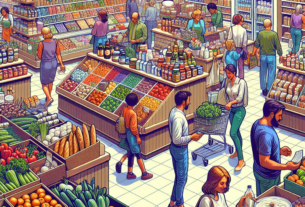Introduction
Grocery brands around the world are increasingly investing in artificial intelligence (AI) and automation to streamline operations, enhance customer experience, and stay competitive in the rapidly evolving retail landscape. In this report, we will analyze which grocery brands are leading the way in AI and automation investments, their strategies, and the impact of these technologies on the industry.
Current State of the Global Grocery Retail Industry
According to a recent report published on CulinaryCoverage.com, the global grocery retail industry is experiencing significant transformation driven by changing consumer preferences, technological advancements, and competitive pressures. In 2025, the industry is projected to reach a market value of over $7 trillion, with online grocery sales accounting for a growing share of total revenue.
Market Share and Key Players
The grocery retail market is highly fragmented, with several key players dominating different regions. In North America, companies like Walmart, Kroger, and Amazon Fresh have a strong presence, while in Europe, Tesco, Carrefour, and Aldi lead the market. In Asia, Alibaba, JD.com, and Seven & I Holdings are key players in the grocery retail sector.
Revenue and Profitability
Despite the fierce competition and thin margins in the grocery retail industry, many companies have managed to maintain healthy revenue growth and profitability. For example, Walmart reported a revenue of over $500 billion in 2024, with a net profit margin of 3.5%. Similarly, Tesco reported a revenue of £65 billion in the same year, with a net profit margin of 2.8%.
Importance of AI and Automation in Grocery Retail
AI and automation technologies have become essential for grocery brands to improve operational efficiency, optimize inventory management, personalize marketing efforts, and enhance the overall customer experience. By leveraging these technologies, companies can reduce costs, increase productivity, and gain a competitive edge in the market.
Benefits of AI and Automation
Some of the key benefits of AI and automation in the grocery retail industry include:
1. Predictive Analytics: AI-powered algorithms can analyze customer data, purchase history, and market trends to predict demand, optimize inventory levels, and reduce stockouts.
2. Personalized Marketing: Automation tools can segment customers based on their preferences, purchase behavior, and demographics to deliver targeted promotions and recommendations.
3. Supply Chain Optimization: AI can streamline supply chain operations by forecasting demand, optimizing routing, and automating inventory replenishment processes.
4. Enhanced Customer Service: Chatbots and virtual assistants powered by AI can provide real-time support to customers, answer common queries, and improve overall satisfaction.
Investments in AI and Automation
Many grocery brands are investing heavily in AI and automation to stay ahead of the competition and meet evolving consumer expectations. For example, Walmart has allocated over $1 billion to digital transformation initiatives, including AI-powered inventory management systems and autonomous delivery vehicles. Similarly, Tesco has partnered with AI startups to enhance its online shopping platform and personalize customer recommendations.
Leading Grocery Brands in AI and Automation Investments
1. Walmart
Walmart is one of the leading grocery brands investing in AI and automation to transform its operations and enhance customer experience. The company has deployed AI-powered robots in its stores to automate tasks like shelf scanning, inventory management, and floor cleaning. Walmart has also introduced autonomous delivery vehicles in select markets to offer convenient and contactless grocery delivery services.
2. Amazon Fresh
Amazon Fresh, the grocery arm of e-commerce giant Amazon, is leveraging AI and automation to revolutionize the grocery shopping experience. The company has introduced cashier-less stores powered by computer vision technology, where customers can grab items off the shelves and walk out without waiting in line. Amazon Fresh is also using AI algorithms to personalize product recommendations and optimize delivery routes for faster fulfillment.
3. Tesco
Tesco, a leading grocery retailer in the UK, is making significant investments in AI and automation to enhance its online shopping platform and streamline operations. The company has implemented AI-powered chatbots to assist customers with inquiries, recommend products based on their preferences, and provide real-time support. Tesco is also exploring the use of robotics in its warehouses to automate order picking and packing processes.
Future Trends and Opportunities
As AI and automation continue to reshape the grocery retail industry, several trends and opportunities are emerging for brands to capitalize on. These include:
1. Hyper-Personalization: AI algorithms can analyze customer data to offer personalized product recommendations, promotions, and discounts tailored to individual preferences.
2. Autonomous Stores: Retailers are experimenting with cashier-less stores and self-checkout kiosks powered by AI to streamline the shopping experience and reduce wait times.
3. Last-Mile Delivery: Companies are exploring autonomous delivery vehicles, drones, and robots to optimize last-mile delivery operations and offer faster, more reliable services to customers.
4. Sustainability Initiatives: AI and automation can help grocery brands reduce food waste, optimize energy consumption, and minimize environmental impact through data-driven decision-making.
Conclusion
In conclusion, AI and automation are playing a crucial role in shaping the future of the grocery retail industry, enabling brands to enhance operational efficiency, drive growth, and deliver superior customer experiences. Leading grocery brands like Walmart, Amazon Fresh, and Tesco are at the forefront of this technological revolution, investing in innovative solutions to stay ahead of the competition and meet the evolving needs of consumers. As the industry continues to evolve, it is essential for grocery brands to embrace AI and automation to remain competitive and drive sustainable growth in the digital age.



